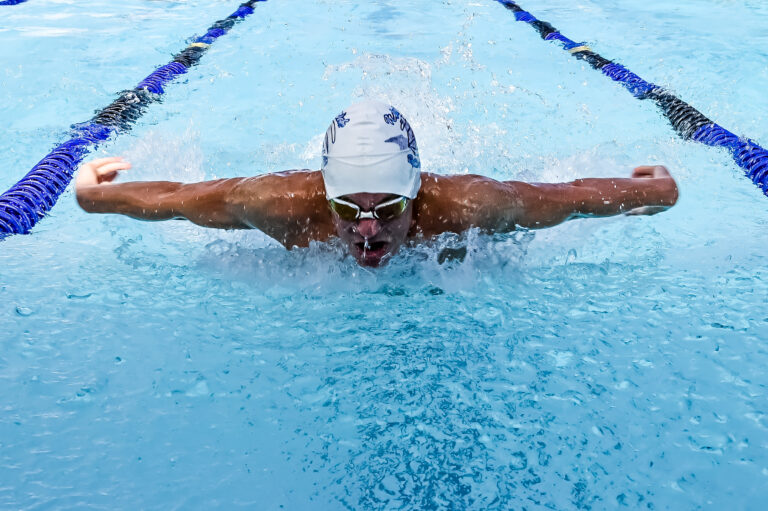By Elizabeth Nelson
SwimTopia Summer Intern, 2018
To Become a Lifelong Swimmer:
STEP 1: END UP IN SUMMER LEAGUE BY ACCIDENT
When I was five, one of my friends’ moms recommended that I join the summer league team because her daughter was doing it. Of course I wanted more opportunities to hang out with my friend so I begged my mom to sign me up, but by then the other family had decided to do some other activity without telling us. I was stuck.
STEP 2: FROM SUMMER LEAGUE TO YEAR-ROUND
I loved summer league after all; my coach was awesome and I loved my new friends. I decided to join a club team a few years later. I honestly can’t remember why I made the switch; I don’t think it was to improve my swimming, so it was probably to spend more time with friends, or perhaps because this great frozen custard place was right next to the pool.
STEP 3: HATE SWIMMING FOR A BIT
I quit club two years later. It happens to the best of us.
STEP 4: YOU CAN TAKE THE SWIMMER OUT OF THE POOL…
…but when you’ve spent the first twelve years of your life in aquatic sports, you lack the coordination and spatial skills required to migrate to any other sport. And sweating? That thing people do in land sports? Unpleasant, to say the least. I joined my high school team after a brief hiatus, and club again shortly after.
STEP 5: FINALLY SEE SOME RESULTS
Texas swimming is very competitive. Although I’m not naturally a bad swimmer, I do lack the natural ability that some of the “greats” are born with. So, until I was old enough to motivate myself and push through hard practices, I didn’t have many big successes. My sophomore year of high school, though, after a year of two-a-days, I dropped a great deal of time and earned a letter jacket (it’s debatable as to whether I cared more about swimming or the jacket at that point). My junior year, a relay I was anchoring won State. I felt like I was on top of the world.
STEP 6: HATE SWIMMING AGAIN
My high school boyfriend came to watch one of my championship meets my senior year. I wanted to impress him by going fast. So fast, in fact, that I broke my finger coming into the wall in the first race of the meet. I taped my fingers together and kept swimming, but my times suffered. “Soul-crushing,” I believe, is the word to describe the feeling of defeat (at your own hands—or finger—no less) after a year of hard training collapses into nothing. But what do we swimmers do after a small existential crisis? We throw ourselves back in the pool and try again, which brings me to…
STEP 7: KEEP OFF THE FRESHMAN 15

I decided to swim in college, more to stay fit than anything else. I also figured it would be easier to start off swimming and then quit if I disliked it than to join after a year of eating dining hall food. Right from the start, I saw benefits left and right: I came into college with fifty friends, it was easier to focus on schoolwork when I didn’t have hours of free time in which to goof off every afternoon.
Exercise kept my mental health in a good place, and adding weightlifting to my training yielded big improvements. Although my first Conference Championship meet was rather “meh,” the experience as a whole was so rewarding that I barely cared about my times.
STEP 8: REAP THE REWARDS
Last semester—the first of my junior year—I finally saw some major time improvements. I think I finally learned to let go; I’m much easier on myself and I barely even look at my times anymore. Ironically, the less I care about my time, the faster it becomes. But you can’t pretend to not care when you really do (I’ve tried doing that. It doesn’t work); it takes time, and maturity, and maybe 15 years of swimming to finally reach a point where you’re confident enough in yourself and your abilities to be just as happy laughing off a 1:10 in the 50 Free as celebrating a :24.
Now that I’m reaching the end of my swimming career and facing the unknown of the Adult World, I’m realizing just how profoundly the sport has affected me. I’ve learned how to set and meet goals from an early age. I have a strong work ethic. My heart and joints are in great condition, so my future knee problems can set in at 32 instead of 31. And I have a group of strange, wonderful, aquatic lifelong friends. So, take it from me—it’s worth it to become a lifelong swimmer. Maybe you’re currently in love with the sport, in which case, great! Keep it up! But if you and swimming are taking a little break and seeing other sports, just make sure to give it another shot. You’ll thank yourself for it.
- Tags: General



